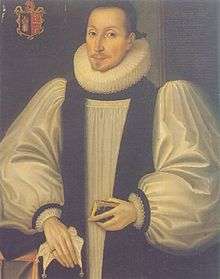Martin Fotherby
Martin Fotherby (c. 1560–1620) was an English clergyman, who became Bishop of Salisbury.

Life
He was born in Grimsby, and studied at the University of Cambridge, where he became a Fellow of Trinity College.[1][2]
He was rector of St Mary-le-Bow,[3] and then in 1596 a prebendary of Canterbury Cathedral. He became Bishop of Salisbury in 1618 and died in London on 11 March 1620 and was buried two days later in All Hallows, Lombard Street.[4] His brother Charles Fotherby was Archdeacon of Canterbury (1595–1615) and Dean of Canterbury (1615–1619).
Works
His Atheomastix; clearing foure truthes, against atheists and infidels was published posthumously in 1622, a work written against atheism. According to the Cambridge History of English and American Literature, (1907–21), Volume VII, Fotherby "relied chiefly on St. Thomas Aquinas in his demonstration of the being of God, and maintained that there is a "natural prenotion" that there is a God."[5] This work was the source of many of the poetic quotations occurring in The Generall Historie of Virginia, New-England, and the Summer Isles (1624), by John Smith of Jamestown.[6][7]
Notes
- "Fotherby, Martin (FTRY576M)". A Cambridge Alumni Database. University of Cambridge.
- . Dictionary of National Biography. London: Smith, Elder & Co. 1885–1900.
- http://www.stmarylebow.co.uk/?History:Celebrated_Rectors
- Penelope Rundle, ‘Fotherby, Martin (c.1560–1620)’, Oxford Dictionary of National Biography, Oxford University Press, Sept 2004; online edn, May 2009 accessed 21 Oct 2009
- http://catterall.net/CHEL/VII/1202.html
- Susan P. Castillo, Ivy Schweitzer, The Literatures of Colonial America: An Anthology (2001), p. 17.
- Karen Ordahl Kupperman, Indians and English: Facing Off in Early America (2000), p. 121.
Further reading
- Philip L. Barbour, Captain John Smith and the Bishop of Sarum. Huntington Library Quarterly, 26 (1962), 11-29. ISSN 0018-7895.
| Church of England titles | ||
|---|---|---|
| Preceded by Robert Abbot |
Bishop of Salisbury 1618–1619 |
Succeeded by Robert Tounson |